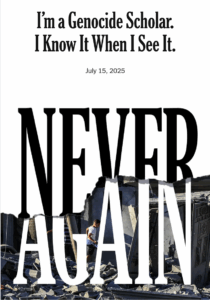“I’m a genocide scholar,” proclaims the headline of Omer Bartov’s recent guest essay in The New York Times. And therefore, he assures us, “I know it when I see it.”
Except this isn’t the first time Bartov, a professor of Holocaust and genocide studies at Brown University, has thought he saw genocide, or something like it, in Israel’s actions toward the Palestinians. In fact, it’s not even the first time since last year.
Although Bartov opens the piece by saying that “a month after the Hamas-led terrorist attacks on Israel on October 7, 2023,” the situation “did not seem to me to rise to the crime of genocide,” a quick review of his public record suggests he had been laying the groundwork for this accusation long before the war in Gaza began.

July 2025 wasn’t some dramatic moral epiphany revealed to readers of The New York Times. Bartov had already publicly declared Israel’s actions a genocide back in December 2024 in an interview with fringe website Democracy Now! His NYT op-ed is simply a polished retread of that declaration.
In the NYT piece, Bartov writes:
“By May 2024, the Israel Defense Forces had ordered about one million Palestinians sheltering in Rafah […] to move to the beach area of the Mawasi, where there was little to no shelter. The army then proceeded to destroy much of Rafah, a feat mostly accomplished by August.”
He concludes that at this point, “it appeared no longer possible to deny” that Israeli operations matched what he calls statements “denoting genocidal intent.”
🧵A strong consensus has formed: there is no genocide in Gaza. Over 50 leading international law, genocide & military experts have rejected the claim. A false narrative pushed by a minority of loud voices falls apart under factual and legal scrutiny. Detail & sources below: 1/ pic.twitter.com/cWxX7IjAe8
— Aizenberg (@Aizenberg55) May 20, 2025
But Bartov’s definition of genocide has always been suspiciously elastic, at least when it comes to Israel. And his eagerness to draw Holocaust analogies long predates this war.
In 2019, Bartov signed an open letter in The New York Review of Books attacking the U.S. Holocaust Memorial Museum for criticizing Rep. Alexandria Ocasio-Cortez’s use of the phrase “concentration camps” to describe U.S. immigration detention centers. The Museum had objected to invoking Holocaust-era language for partisan ends. Bartov disagreed, calling the Museum’s stance “fundamentally ahistorical” and claiming it undermined Holocaust memory and education.
In other words, Bartov has a habit of defending far-fetched analogies, so long as they point in the direction he favors.
This pattern continues in his commentary on Israel. In May 2021, during a short war triggered by a Hamas rocket barrage on Israeli civilians, Bartov wasn’t focused on terrorism, incitement, or Hamas’s genocidal charter. Instead, he urged American universities to “teach about Israeli state violence against Palestinians” and to feature “Palestinian scholars and activists” in conferences on genocide and mass violence. He has used the term “Nakba” (catastrophe in Arabic) to describe modern Israel’s founding in 1948, when it was attacked by a coalition of neighboring Arab armies.
When the New York Times Needs a (Jewish-Israeli) Genocide Scholar
When The New York Times wants to amplify accusations of genocide against Israel, it doesn’t turn to fringe activists or anonymous social media accounts. It finds a Jewish Israeli professor willing to say it in their pages. Bonus points if he’s spent years blurring the definition of genocide and repurposing “Never Again” for unrelated political causes.
Let’s also be honest. Identity politics plays a role here. The Times knows that featuring a Jewish Israeli lends the accusation a veneer of credibility and “internal dissent.” It’s not subtle. It’s strategic.
But if we’re going to talk about genocidal intent, we have to look at the actual statements Bartov cites. HonestReporting board member Salo Aizenberg has done just that, and found Bartov’s examples either wildly out of context or plainly misrepresented. Phrases like “the enemy will pay a huge price” or “turning Hamas strongholds into rubble” are spun as genocidal, despite clearly referring to Hamas. Warnings for civilians to evacuate are presented as evidence of extermination. Even Netanyahu’s use of the biblical phrase “Amalek,” found on memorials at Yad Vashem and The Hague, is treated as uniquely sinister. Bartov’s case, in short, relies on selective quoting and distortion. (Full breakdown embedded below.)
🧵Omer Bartov’s NYT piece charging Israel with genocide fails in the opening paragraphs. His five examples of “genocidal intent” by Netanyahu & Gallant are grossly misrepresented or invented. None come anywhere close to meeting the legal bar of “special intent.” Analysis⬇️ 1/ pic.twitter.com/nmktkfaaq1
— Aizenberg (@Aizenberg55) July 16, 2025
And when the main Israeli leadership fails to meet even the loosest standard for genocidal intent, Bartov simply pivots to fringe figures with no operational control, like Smotrich or Nissim Vaturi. That move alone concedes how weak his central thesis really is.
The New York Times wants readers to see Bartov’s genocide declaration as a bold moral stand. But it isn’t. It’s the culmination of years of unfair and unfounded accusations against the Jewish state, now rebranded as expert opinion.
What else is new?
Liked this article? Follow HonestReporting on Twitter, Facebook, Instagram and TikTok to see even more posts and videos debunking news bias and smears, as well as other content explaining what’s really going on in Israel and the region. Get updates direct to your phone. Join our WhatsApp and Telegram channels!


